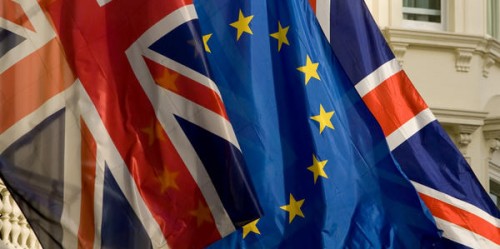
There are a huge number of noble, enlightened and altruistic reasons for the British people to vote to stay in the EU. Many people will listen to these, ignore them, and cast their ballot to stay in the bloc for one simple reason: the alternative sounds a lot worse.
This is especially the case for some core Labour voters. They dislike the expense of the EU, its relatively undemocratic way of operating and the broader feeling that the union is a “political project” which, through accident or design, encroaches on to the sovereignty of Britain – but they dislike the threat of unemployment even more and will reject Brexit.
I can understand the feeling. The EU has many flaws, as everyone from Jeremy Corbyn to David Cameron has admitted, but the prospect of walking away is far less appealing – and even more dangerous – than staying in and fighting for change. Don’t be a “quitter”, as Sadiq Khan said in last night’s televised debate.
As even the Outers admit, there would be a shock to the British economy in the immediate aftermath of Brexit. To deliver another economic spasm, less than a decade after the tumult of the banking crisis and the recession that followed, would be reckless.
George Osborne has said that “Brexit is for the rich”. On Monday night, when he fielded questions from an audience of under-35s, Corbyn didn’t do much to distance himself from this notion. Neither would I. Although support for Brexit is spread from the top to bottom of society, the consequences would be tolerable for the top and far worse for the poorest people. The consequences of any economic shock are worse for the people with least.
Corbyn, Alan Johnson and Gordon Brown pushed a Labour In campaign based around the protection of workers’ rights, action on climate change and reforms to tackle tax avoidance. These might not have made the heart beat much faster – although GB can still prompt moments of exhilaration among the faithful, as he did with his Fabian Society speech – but they have been practical appeals to the better judgement of left-wing voters. Bread and butter issues, as pundits used to say.
This has been the correct approach. There was a time in the late 1990s, under Tony Blair, when Labour seemed to be in love with the EU. This reached its zenith when Blair, after flirting with the idea of taking Britain into the single currency, shared a platform with former Tory Cabinet ministers Michael Heseltine and Kenneth Clarke at the launch of Britain in Europe in 1999. It was a passion I never quite understood. Fresh from scraping through my economics A-level, I burned with mixed emotions about Brussels.
Of course, the EU and its predecessor organisations have played a huge part in preserving peace on the continent over much of the last 60 years. Thankfully, however, the threat of war on our doorstep has receded to the point where it is low down on voters’ list of concerns. Even Cameron avoided directly uttering the words “World War Three” until they popped out of his mouth, in the form of a denial, at Prime Minister’s Questions.
There are other, loftier arguments, to back staying In. Even in times of relative peace, there is still a strong case for co-ordination with our European neighbours. The horror of the refugee crisis, unfolding on the borders of the continent, demands action from the EU and other major global institutions. It cannot be solved by just a handful of countries acting alone.
At the same time as hearing these liberal, outward justifications for the EU, many of the base arguments put forward by Tory or UKIP politicians on the Leave campaign have been deceitful or simply disgraceful. They persisted with the use of the claim that Britain sends £350m a week to the EU even when it had been rubbished by the head of the UK Statistics Authority. Some of them, such as Nigel Farage, posed in front of the shameful “Breaking Point” poster of a queue of migrants – although Michael Gove said the image “made him shudder”. And they posed as friends of immigration which is such an absurd proposition coming from the Kippers that it requires no explanation here.
This was an historic opportunity for the Outers – but it looks like they may have blown it. They got the referendum they wanted despite expectations to the contrary. Cameron vowed not to “keep banging on about Europe” but was then forced to grant a poll while under severe pressure from UKIP in 2013. Yet, gifted this opportunity, many of the Leave supporters gone on to fight an ugly campaign that raised concerns over sovereignty and public spending before returning, predictably, to the issue of immigration.
Britons should and, I think, will choose to stay In. It matters less whether we vote for the EU enthusiastically or reluctantly. The choice between the idealism of leaving or the pragmatism or sticking with what we know has been characterised as a battle between heart and head. To me, the case for the bloc embraces both. That’s why I will vote Remain tomorrow.




More from LabourList
Starmer or Sarwar: Scottish Labour MSPs and MPs split over Keir Starmer’s future
‘Every Lidl helps: What can the Government do to bring down food prices?’
Delivering in Government: your weekly round up of good news Labour stories